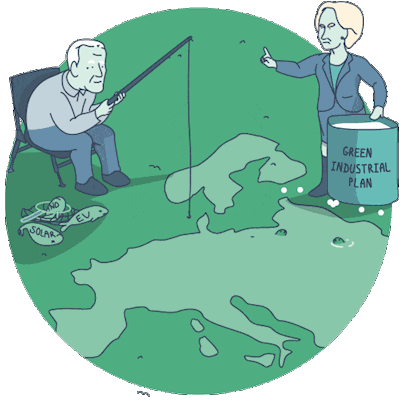You are using an outdated browser. Please upgrade your browser to improve your experience.
Article | 27 February 2023 | ESG

Biden’s Inflation Reduction Act disrupts the green energy investment landscape
European countries are locked in a heated debate over how best to respond to the Biden administration’s Inflation Reduction Act (‘The Act’), amid mounting evidence that it has already caused the EU to lose out on green investment to North America.
So far, US-based companies have received around $35 billion in new green investment since President Joe Biden approved this legislation in August last year. One of the biggest outlays so far has been the €800 million announced by German auto giant BMW in February to expand electric vehicle (EV) production in Mexico.
Alongside the US, North American Free Trade Area members Mexico and Canada are also beneficiaries of the Act, being eligible for sizeable tax credits directed at EV assembly and battery production.
Combating climate change was a major Democratic Party election pledge, with Biden returning the US to the Paris Climate Agreement shortly after becoming president in January 2021.
Then came the Act, with its massive US federal funding for clean energy through tax credits, loan guarantees and subsidies. The Act’s supporters expect the policy to create around $369 billion in clean energy investment and reduce US greenhouse emissions by 40% versus 2005 levels by 2030. Most of the green funding in the legislation is targeted at clean electricity generation followed by transportation, including big funding for the EV industry.
The EU has criticised the Act for creating what it views as unfair competition, adding to worries about the competitive threat posed by the less transparent subsidies offered to green industries in China.
However, there are deep divisions within the EU over how the bloc should respond. In one camp led by France, there’s a strong appetite to allow individual countries to ramp up state aid, targeting green industries. While this has met with some opposition from smaller members, there’s an apparent lack of support for mobilising higher additional funding on an EU wide basis. In a state aid free-for-all, smaller EU countries will likely struggle to compete with Germany and France in attracting green investment, given the latter two’s greater size and consequently larger budgets.
EU leaders will consider the bloc’s green industrial strategy at a summit in March.

Architas view
The Inflation Reduction Act has important implications for how countries seek to promote state investment in green energy around the world. It makes a global bidding war on subsidies seem more likely, as governments race to stop domestic green energy companies from moving their operations to North America or selecting the region as the default base for major new projects in the future.
This legislation presents challenges for EU policy. Europe will likely need to offer more incentives, if it wants the green energy industry to keep flourishing on its shores. The bigger picture is that the world desperately needs to ramp up investment in green energy and it is good news that the Biden administration is taking climate change seriously.